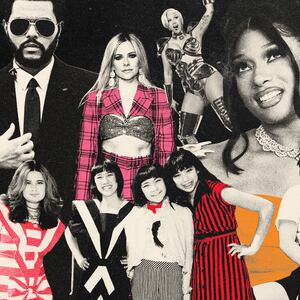Art that speaks to our COVID-stricken state of the world can be a hit or miss, either capturing our isolation in a way that’s empathic and comforting or making our current nightmare feel endless. On his just-released album Dawn FM, The Weeknd, aka Abel Tesfaye, along with new BFF Jim Carrey, allows listeners to imagine another stage after the darkness, offering hypnotic, dance-ready tunes to mollify us while we wait.
Explaining the album’s radio-structured concept in a recent Billboard interview, Tesfaye imagined listeners “stuck in traffic waiting to reach the light at the end of the tunnel” with a “radio host guiding [them] to the light and helping them transition to the other side.” Carrey is our disembodied, quasi-spiritual escort on this journey, in a guest appearance that recalls Robyn’s surprise cameo on Lorde’s “Secrets From A Girl (Who’s Seen It All)” off last year’s Solar Power. However well-worn, these ideas of transition, purgatory, cleansing, and darkness-into-light lend themselves to our currently stalled moment, whether you’re looking for something temporarily soothing or seeking a more long-lasting sense of hope. More than anything, the innovative utilization of these themes indicate The Weeknd’s quest to grow and transform as an artist—and maybe even a person—in his most enlightened project to date.
After his chart-dominating and critically acclaimed After Hours era, it didn’t seem like there was anywhere else for The Weeknd to go; at least, for the maniacal, red-suited version of himself we watched run wild through Las Vegas, get beat up, commit murder, and undergo plastic surgery. Now, donning old-age prosthetics on his Dawn FM album cover, he presents the aftermath of a fast life in a way that feels regretful and melancholic, but also indicative of a new level of consciousness.
The year 2020 saw the Toronto singer boast callously about being “Heartless” and apathetically label himself the “Hardest To Love,” but Dawn FM illustrates a level of self-work and acknowledgment of inflicted pain that feels unprecedented in his solipsistic oeuvre. Tesfaye isn’t a totally rehabilitated man—nor do his fans likely want him to be—but his tone on this album is noticeably less egotistical.
Specifically, the album’s seventh track, “Out of Time,” which borrows Tomoko Aran’s “Midnight Pretenders,” feels like a correction of The Weeknd’s last No. 1 hit from After Hours, “Save Your Tears,” in which he arrogantly demands the love of a woman he knows he’ll hurt again. On the standout track “Sacrifice,” the singer laments the fear of lost time and freedom that makes him unsuitable for a committed relationship, perfectly contrasted by the guitar loop from Alicia Myers’ upbeat 1981 R&B single “I Want To Thank You.” There’s also the sublime “Less Than Zero,” the album’s final sung track, which sounds ripped from The Killers’ debut album Hot Fuss. There’s a purifying quality to Tesafye’s echoed, choral-sounding vocals as the album comes to a close and after he’s confessed to all of his sins. That song, paired with the final track—a soliloquy performed by Carrey called “Phantom Regret by Jim”—provide a satisfying emotional payoff.
There’s also a personal interlude by Quincy Jones, “A Tale By Quincy,” which feels like another shot at presenting a new kind of vulnerability—although it's maybe equally telling that it’s being relayed by someone else besides The Weeknd. The 28-time Grammy winner’s presence feels pointed, considering the comparisons Tesfaye has earned to Jones’ most famous collaborator, Michael Jackson. Aside from the prestige of having a noted musical genius contribute to (and, in turn, co-sign) your album, the 88-year-old Jones has also built a reputation over his career as a playboy and, therefore, appropriately reflects on the way his upbringing gave birth to intimacy issues and his difficulty being a father.
But despite its confessional tone, Dawn FM isn’t totally self-punishing. Tesfaye is still a man of pleasure and enjoys being swept up in the whirlwind of a romantic—mostly sexual—encounter on the album’s earlier tracks “Take My Breath” and “Gasoline.” And “Here We Go… Again,” featuring a rather forgettable verse from Tyler, the Creator, recounts the thrill of a fated relationship with a movie star. Whether Tesfaye is taking poetic liberties in expressing a healthy human desire or still taking these behaviors to destructive levels is one of Dawn FM’s blurred lines. Overall, the album flirts with ambiguity and unknown possibilities, specifically regarding what awaits our tortured protagonist in the “After Life,” as advertised by Carrey at the end of “Every Angel is Terrifying.”
Both narratively and sonically, Dawn FM feels like the most confident piece of work Tesfaye has produced after his acclaimed mixtape run that put him on the map. The ‘80s synth-pop and new-wave ambitions of the Daft Punk-produced Starboy and portions of After Hours are fully realized and strikingly less difficult with the help of previous collaborators Max Martin and Daniel Lopatin, aka Oneohtrix Point Never. A less adept pop star attempting to capture this particular period in music, playing around with an English accent, and trying out a David Byrne impression would usually incite mockery. But these choices are instead economical and well-conceived.
Knowing Tesfaye’s affinity for cinema—and by the looks of the album’s promotional videos—we’re likely to get more insight into his Rip Van Winkle transformation in the coming weeks, revealing more of what this hypnotic new journey entails. If social media is any indication so far, The Weeknd is in for yet another blockbuster era.







